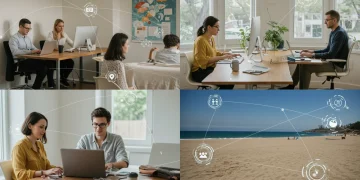Employment readiness payments for young adults explained

Employment readiness payments provide crucial financial support and resources for young adults, enhancing their job readiness skills and paving the way for successful careers.
Employment readiness payments for young adults are designed to assist young people as they transition into the workforce. Have you ever considered how financial support can bridge the gap between education and employment? Let’s dive in and explore this crucial topic.
Understanding employment readiness payments
Understanding employment readiness payments is crucial for young adults as they embark on their work journey. These payments can help ease the financial burden while they develop necessary skills for the job market.
The main purpose of these payments is to support young people in gaining essential work experience. As many young adults face challenges when entering the workforce, these funds provide a safety net during their transition. Receiving financial assistance can also help reduce stress, allowing them to focus on building their careers.
What Are Employment Readiness Payments?
Employment readiness payments come in various forms. They can be direct financial support or services that assist in skill development. Examples include:
- Job training programs
- Workshops on resume writing
- Interview preparation sessions
- Stipends for transportation or work-related expenses
These resources are designed to enhance employability and help youth transition smoothly into work environments.
Who Is Eligible for These Payments?
Eligibility typically includes young adults aged 16 to 25, though age ranges may vary. To qualify, applicants may need to demonstrate:
- Financial need or low income
- Participation in an approved job training program
- Commitment to seeking employment
Understanding these requirements is vital for those wanting to utilize the support effectively. Young adults should check local guidelines for more specific criteria.
In addition to helping cover immediate expenses, employment readiness payments offer opportunities for young people to develop skills that enhance their future job prospects. With the right support, they can build confidence and increase their chances of securing stable employment. The experience gained can be invaluable as they navigate their career paths.
Eligibility criteria for young adults
Eligibility criteria for young adults seeking employment readiness payments are essential to understand for those looking to access this valuable support. These criteria help ensure that the funds reach those who need them most.
To qualify, young adults typically need to meet specific requirements set by local programs. Age is a key factor; most programs target individuals aged 16 to 25. However, some may have different upper limits, so checking local guidelines is important.
Common Eligibility Requirements
In addition to age, applicants often face other criteria, including:
- Proof of financial need or low income status
- Enrollment in a recognized training program
- Commitment to actively seeking employment
- Residency within the program’s geographic area
Understanding these requirements can help young adults navigate the application process more effectively. Even minor misconceptions can lead to applications being denied.
Documentation Needed
When applying, applicants should prepare specific documents. Typical paperwork may include:
- Identification documents, such as a driver’s license or state ID
- Proof of income, like pay stubs or tax returns
- Enrollment letters from training programs
Having these documents ready can streamline the application, minimizing delays. In order to take full advantage of the assistance available, it’s vital for young adults to be organized and proactive.
Overall, being familiar with the eligibility criteria for young adults will empower them to access the resources needed for a successful transition into the workforce. The right support can make all the difference as they prepare for their future careers.
How to apply for payments

How to apply for payments is an important step for young adults seeking financial assistance as they prepare for the workforce. The application process might seem daunting, but with the right guidance, it can be straightforward.
First, it’s crucial to gather the required documents before starting the application. These typically include proof of identity, financial information, and any supporting documentation from training programs. Being prepared can make the process smoother.
Steps to Apply
The following steps provide a clear roadmap on how to apply for these valuable funds:
- Research local programs offering employment readiness payments and their specific application requirements.
- Collect necessary documentation, such as IDs and proof of enrollment in training.
- Complete the application form, ensuring all information is accurate and complete.
- Submit the application, either online or in person, as per the program guidelines.
Once submitted, it’s essential to follow up if there are any delays or if additional information is required. Being proactive can help avoid unnecessary wait times.
Understanding where to submit applications can also impact the speed of processing. Many programs offer online submissions, which can be quicker than traditional mail. Checking the expected processing times can help manage expectations.
Tips for a Successful Application
Here are some tips that can increase the chances of a successful application:
- Double-check all information for accuracy, as mistakes can lead to delays.
- Ask for assistance from program advisors when needed, as they can provide valuable insights.
- Keep copies of everything submitted for your records.
Being aware of deadlines is also crucial. Many programs have specific windows in which to apply, so staying informed will ensure that opportunities are not missed. Ultimately, knowing how to apply for payments can greatly enhance a young adult’s journey toward employment readiness.
Impact on job readiness skills
Impact on job readiness skills is a critical aspect for young adults benefiting from employment readiness payments. These payments not only provide financial support but also enhance essential skills that are vital in the workplace.
When young adults receive assistance, they gain access to various resources that improve their job readiness. For instance, many programs include workshops that teach valuable skills such as communication, teamwork, and problem-solving. These skills are essential for success in any job.
Key Skills Developed
Through targeted training, several key job readiness skills are developed:
- Effective communication: Learning how to express ideas clearly is crucial in any work environment.
- Time management: Young adults are taught to prioritize tasks and meet deadlines, which is key in any job.
- Critical thinking: Developing the ability to analyze situations and solve problems enhances workplace effectiveness.
- Collaboration: Understanding how to work with others fosters a healthy work environment.
By focusing on these skills, employment readiness payments play a significant role in preparing young adults for future job challenges. When they feel confident in their abilities, they are more likely to succeed.
Long-Term Benefits
The impact of improved job readiness skills extends beyond just securing a first job. As young adults become more skilled and self-assured, they often see broader career prospects. Employers highly value candidates with a strong skill set. Therefore, those who undergo training become more competitive in the job market.
In addition to job-specific skills, many programs encourage the development of soft skills, which are essential. These include adaptability, leadership, and interpersonal skills. Young adults who can demonstrate these traits are often more sought after by employers.
Overall, understanding the impact on job readiness skills helps young adults recognize the value of these payments as they navigate their career paths. This support not only aids immediate job placement but also lays the foundation for long-term professional success.
Success stories from beneficiaries
Success stories from beneficiaries of employment readiness payments showcase the transformative impact these funds can have on young adults’ lives. Hearing real-life experiences helps illustrate the tangible benefits of such programs.
Many young adults have faced significant challenges on their path to employment, and these payments have provided the critical support needed to overcome obstacles. With financial assistance, they have been able to focus on enhancing their skills without the constant worry of daily expenses.
Inspiring Transformations
Consider the story of Alex, a recent high school graduate. With the help of employment readiness payments, Alex enrolled in a job training program. This allowed him to gain practical skills in technology, leading to his first job as a helpdesk technician. He credits this opportunity to the financial support that enabled him to pursue the training necessary for success.
Another success story comes from Maria, who struggled to find a job after college. The financial assistance she received allowed her to attend workshops that improved her interview skills and resume writing. As a result, Maria gained the confidence to apply for positions she once thought were out of reach. Today, she is thriving in her new role as a marketing assistant and encourages others to seek help when needed.
Community Impact
These individual successes contribute to a larger community impact. When young adults succeed, they contribute more effectively to the economy and their communities. Financial support fosters a sense of independence, allowing them to take control of their careers. As they grow, they often inspire their peers, creating a ripple effect of motivation and ambition.
Moreover, success stories often highlight the importance of mentorship and guidance provided by program leaders. Young adults who have experienced similar backgrounds understand the challenges faced by their peers. Their journeys can motivate others to pursue their goals with resilience and determination.
In conclusion, the stories of beneficiaries illustrate the profound difference that employment readiness payments can make. By supporting young people in their transition to the workforce, these programs not only change individual lives but also strengthen communities as a whole.
FAQ – Frequently Asked Questions about Employment Readiness Payments
What are employment readiness payments?
Employment readiness payments are financial supports provided to young adults to help them gain necessary skills and prepare for the workforce.
Who is eligible to apply for these payments?
Typically, young adults aged 16 to 25 who demonstrate financial need and are enrolled in job training programs can apply.
How can these payments impact job readiness skills?
These payments provide access to training and workshops that enhance communication, teamwork, and problem-solving skills vital for employment.
Can you share success stories of beneficiaries?
Yes, many beneficiaries have gone on to secure jobs and thrive in their careers, attributing their success to the support received through these programs.





